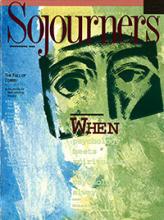Driving into Moscow from Sheremetevo Airport, on the Tuesday afternoon after Sunday's coup, the traffic backed up and the sky, already dull, gradually became dark, as if we had penetrated a cloud. About the same time, we noticed small groups of people standing alongside the Leningrad highway, unable to take their eyes from the street. I thought I noticed a woman crying.
Suddenly, our car caught up with the cause of the staring and the darkness -- a mile-long column of tanks and armored personnel carriers rolling toward the center of the city, their tracks clogged with dirt that flaked off into a great shroud of dust over the road behind them. We drove past the column, looking at the expressionless faces of the young soldiers on their terrible mission against their own people. Later, many of the troops became heroes of the resistance, but none of us knew their future that afternoon. All that was obvious was massive force and silent bystanders, the portents of some new calamity for this sad country, the rumbling evil of tanks in a city.
I had been on vacation with my family in the quiet and beauty of New Hampshire when the 1 a.m. call came from the NBC News desk in New York: Gorbachev had been deposed by a coup. (So much for the theory that August is a good time for reporters to take home leave because nothing ever happens then.) I drove to Boston through the first torrents of Hurricane Bob, joined a panel on the Today program, and took the first plane "home."
I said that day that the people and the army had changed enough in recent years so the coup might fail, but I had no idea it would happen so quickly and completely. In retrospect, "The Plotters," as Gorbachev called them, had already failed by the time I and a dozen or so other reporters first saw the dust and the tanks.
Read the Full Article

